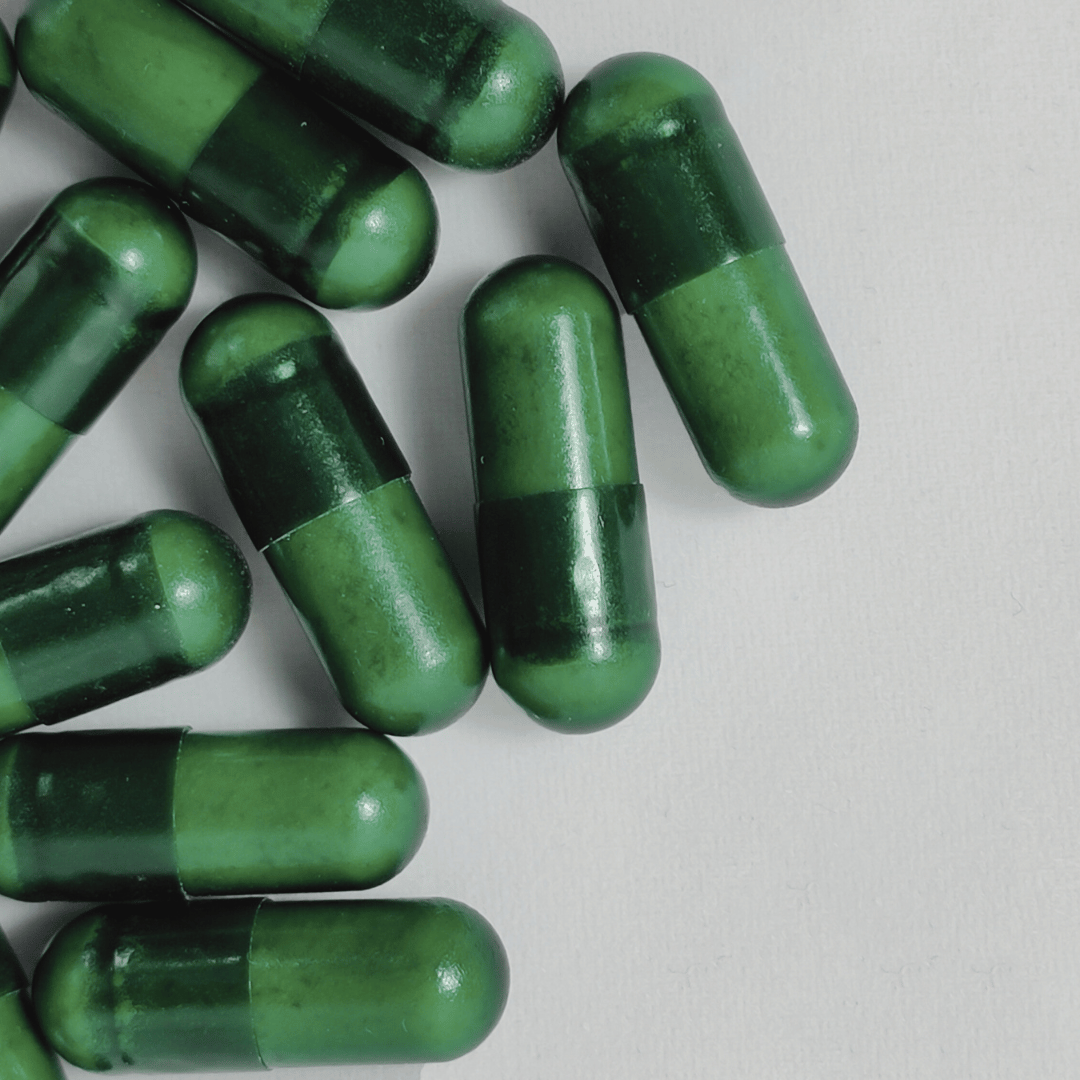Reading time: 10 minutes
In addition to the active ingredients, you will often find other information on the label of nutritional supplements ingredients. These are excipients that are important for the quality of the product and for its proper production. In this blog post, we'll tell you all the ins and outs of these excipients in supplements.
What are excipients in supplements?
Dietary supplements come in all shapes and sizes, such as tablets, capsules, drops , and softgels . Besides active ingredients, these supplements often also contain excipients.
But what exactly are excipients in supplements?
By excipients we mean substances such as fillers, binders and anti-caking agents that are added to the product because of certain properties.
The amount of excipients varies per supplement. For example, tablets often contain more excipients than capsules, and sometimes powder or liquid supplements lack excipients altogether.
The functions of excipients
Excipients perform several functions, including:
- The design of the supplement that makes it possible to take it (think of a tablet).
- Ensuring the quality of the supplement, such as ensuring the stability of active ingredients.
- Extending the shelf life of a product by preventing spoilage.
- Improving the taste and appearance of the supplement.
- Supporting the production process.
- Increasing the bioavailability of active substances.
The safety of excipients
Are excipients in supplements safe? This is a question we often hear.
The excipients added to our supplements have been thoroughly tested and approved by the European Food Safety Authority (EFSA). A Recommended Daily Allowance (RDA) has been established for these substances, which is the maximum amount you can safely consume per day. All excipients we use are 100% natural and therefore considered safe to consume.
What excipients are in supplements?
Excipients in supplements have specific properties and therefore fall into specific categories. Here, we'll discuss some of these categories, provide examples of commonly used excipients, and share our opinions. Are these excipients really necessary?
Anti-caking agents
The fine particles of a powder can clump together when they come into contact with moisture. To prevent this, anti-caking agents are used. These agents ensure that the powder, containing all its active ingredients, is evenly distributed throughout the tablets or capsules. Moreover, an anti-caking agent prevents the product from sticking to the machines and causing them to jam.
Examples: silicon dioxide, microcrystalline cellulose and magnesium salts of natural fatty acids.
Binders
Binders help keep the ingredients in a supplement together and prevent them from separating. They therefore offer several advantages:
- By providing structure and consistency, forming tablets and capsules is easier.
- This allows substances to dissolve in water or other liquids, which can improve absorption into the body.
- It supports the stability of the ingredients so that moisture, light and heat have less influence on them.
Examples: maltodextrin, microcrystalline cellulose, glycerol, and gum arabic.
Capsules and coatings
The active ingredients in a supplement require a protective coating or shell. A capsule can be made of gelatin (of animal origin) or hydroxypropyl methylcellulose, abbreviated as HPMC (of plant origin).
A coating on capsules or tablets protects the supplement from moisture and temperature, masks an unpleasant taste of active ingredients, makes a supplement easier to swallow and makes it look attractive.
Examples of coatings: (fish) gelatin, vegetable cellulose (HPMC), pullulan (vegetable), beeswax and carnauba wax (glazing agents).
Preservatives
Preservatives are added to extend a product's shelf life by inhibiting the growth of bacteria, yeasts, and molds. There are natural and artificial sources of preservatives.
Examples: antioxidants such as vitamin E, maltodextrin, and sodium benzoate.
Colorants and flavorings
Colorants and flavorings are added to make a supplement appealing. Colorants are used to enhance the appearance, and flavorings to optimize the taste. Flavorings are primarily found in lozenges and chewable tablets, and in liquid supplements.
Examples: sugar, aspartame, sucralose, fructose, xylitol, stevia, sorbitol, mannitol, natural fruit flavors, and iron oxide (natural color pigment).
Stabilizers
Stabilizers are important for ensuring product stability, preserving properties like color and texture. They also preserve unstable mixtures of substances that don't naturally mix, such as water and fat.
Examples: glycerol, pectin and gum arabic.
Fillers
Fillers add bulk to give a product more volume. This allows the supplement to maintain a normal size, even at low doses, without having to increase the dosage of the active ingredient.
Examples: silicon dioxide, cellulose, maltodextrin, mannitol, calcium carbonate and magnesium salts of natural fatty acids.
Now tell me, it doesn't sound very appetizing that this is in your supplements, does it?
It's really frustrating when you're doing so well with your diet, but you still get all kinds of junk through your supplements.
Because would you...?
-
Would you like to top your sandwich with talcum powder?
-
Sprinkle some silicon or titanium dioxide over your food every day?
-
Do you consider the use of gloss agents and fillers necessary?
Most likely not.
That's why we'll show you which ingredients you should avoid and why.
-
Cellulose
-
Stabilizer
-
Polyvinyl / Polypyrrolidone
-
Gloss agent
-
Anti-caking agent
-
Magnesium stearate
-
Silicon dioxide
-
Talcum powder
-
Dyes
-
Titanium dioxide
Where can you find these common excipients?
- Silicon dioxide - An anti-caking agent derived from sand and rock. It's used in the manufacture of windows and mirrors. Silicon dioxide is also found in foods like cheese, spices, sweeteners, and salt.
-
Magnesium Stearate - The magnesium salt of stearic acid, used as an anti-caking, filler, or glazing agent. Stearic acid comes from animal and vegetable sources such as meat, fish, dairy, eggs, and vegetable oils.
-
Sodium Benzoate - It can also be used synthetically to prevent spoilage.
-
Maltodextrin - Often used as a filler, binding agent, or preservative, it has a mildly sweet flavor. Maltodextrin is extracted from the starch of corn, rice, wheat, or potatoes.
-
Sucralose - A sweetener made by processing sugar. Excessive use can cause stomach and intestinal problems.
-
Flavorings - Natural flavors that add flavor to a product. These are added to enhance product compliance, especially in products where flavor plays a role, such as powdered products, melt-in-the-mouth tablets, and chewable tablets.
-
Cellulose - A fiber derived from plants or wood that can be used as a filler or anti-caking agent. The body cannot digest cellulose. Microcrystalline cellulose and HPMC are made from cellulose.
Finally: excipients in Goldea Health supplements
At Goldea Health, we guarantee the highest quality and safety of our supplements. That's why our products contain carefully selected excipients to ensure their effectiveness and quality. Some examples of the ingredients we use include:
- Nettle leaf : Known for its supportive effect on the kidneys and the immune system.
- Olive Oil : A healthy source of fat that aids in the absorption of fat-soluble vitamins.
- Alpha-herb : A powerful antioxidant that helps neutralize free radicals in the body.
The use of natural excipients such as nettle leaf and olive oil ensures that our supplements are not only effective, but also safe for daily use.
Did you find this interesting or would you like to know more?
We have a free mini-course "Know What You're Taking" available. Click here for more information!
Conclusion
At Goldea Health, we believe in the power of nature. That's why we ensure our supplement ingredients are not only safe but also contribute to your health.
Do you have questions about excipients in supplements? Our team of orthomolecular therapists is ready to help you.
So, are excipients in supplements safe? Yes, at Goldea Health, you can trust the quality and safety of our carefully selected excipients. Your health is our priority, and we're here to support you on your path to better health.
Would you like someone to review your situation with you and provide personalized advice? That's possible! Click here for free advice from our orthomolecular therapist.



